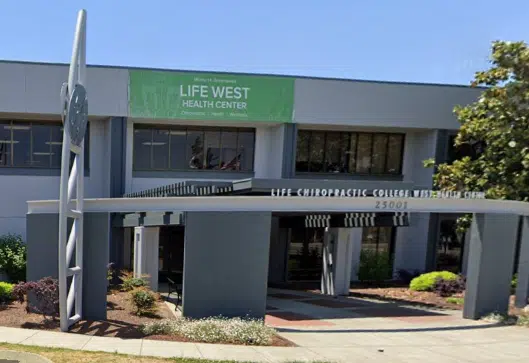
A disturbing legal battle is unfolding in Alameda County Superior Court, where five women have accused Life Chiropractic College West in Hayward of failing to act on reports of sexual misconduct involving one of its instructors, Cedric Stewart. The lawsuit, filed last week, alleges that Stewart, 35, used his role as a teacher to manipulate and assault female students under the guise of professional care, with the college allegedly turning a blind eye to their complaints, according to KQED.
The allegations include incidents of sexual misconduct at Stewart’s private practice, inappropriate behavior on campus, and even an assault during a chiropractic conference in Denver. According to the lawsuit, the college not only failed to investigate the reports but also allowed Stewart to continue teaching and representing the institution at events throughout 2023.
The case includes harrowing details from one woman who sought Stewart’s professional help after a car accident in late 2021. Unable to find another chiropractor, she began treatment with Stewart, who had taught two of her classes. The lawsuit claims Stewart exploited the woman’s vulnerability, pressuring her to share personal details and making inappropriate comments during their sessions.
In one chilling instance, while she lay on a treatment table, Stewart allegedly climbed on top of her, trapping her under his body. “What would you do if I tried to kiss you?” he reportedly asked, leaving her frozen in fear. During another session, he allegedly moved his hand between her legs while performing soft tissue manipulation, making inappropriate comments about her body.
The woman reported the incidents to a department chair at Life West in early 2023 but says no meaningful action was taken. She later learned that other students had also complained about Stewart, yet he remained in his position.
The lawsuit details similar allegations from four other women, who reported being subjected to Stewart’s inappropriate behavior, including unwanted touching, explicit comments, and coercion during chiropractic sessions. One woman described how Stewart allegedly used his position as an instructor to isolate and prey on students, citing his open marriage and promotion of discounted treatments at his private practice as methods to gain their trust before crossing professional boundaries.
Despite the gravity of the allegations, the women claim the college failed to act. Two plaintiffs say they were promised an investigation, but never heard back. Another alleges that when she expressed feeling unsafe on campus, the dean admitted there were no established procedures for handling sexual assault or Title IX complaints.
The plaintiffs accuse the college of violating Title IX, the Civil Rights Act, and California’s education code by failing to protect students and ensure a safe learning environment. As a result, several women have reported severe emotional and physical tolls, including PTSD, panic attacks, and ongoing nightmares. One student was forced to switch to remote classes, while others say they lost professional opportunities due to the trauma they endured.
Neither Stewart nor Life West has responded to requests for comment. The college now has 30 days to file a response to the complaint. Meanwhile, the women’s allegations have sparked broader concerns about the accountability of educational institutions in addressing reports of harassment and assault.
The lawsuit seeks to expose what the plaintiffs describe as a systemic failure to protect students and prevent further harm—a failure that, they argue, has left lasting scars on their lives.

When students experience sexual abuse by a chiropractic teacher, the emotional and legal challenges can feel overwhelming. To learn more, we sat down with experienced California attorney Jason Amala to discuss the legal protections available to victims, how institutions are held accountable for negligence, and the steps individuals can take to seek accountability through civil lawsuits.
Editor Darla Medina: Let’s start with the basics. What legal rights do students have if they’ve been sexually abused by a teacher or authority figure at private college?
Attorney Jason Amala: Students have significant protections under both state and federal laws. In cases like this, Title IX is a key federal statute. It mandates that schools receiving federal funding must provide an environment free from gender-based discrimination and harassment, including sexual abuse. In California, there are additional protections under the Civil Rights Act and the education code, which hold schools accountable for maintaining a safe learning space. Victims can file lawsuits against both the perpetrator and the institution if the institution fails to act on reports, ignores warning signs, or lacks appropriate safeguards.
Medina: When holding a school accountable, what factors typically determine whether the institution itself can be found liable?
Amala: Liability often hinges on what the school knew and how it responded. If a victim or others reported the misconduct and the school failed to investigate, take preventive measures, or remove the individual from a position of power, the institution could be held responsible. Schools are also expected to have policies in place to handle complaints, and failing to implement or follow those policies can contribute to liability. Essentially, negligence by the institution—whether through inaction or inadequate safeguards—creates grounds for a civil lawsuit.
Medina: What kind of damages can victims pursue in a civil lawsuit like the one filed against Life Chiropractic College West?
Amala: Victims can seek both economic and non-economic damages. Economic damages might include costs related to therapy, missed educational opportunities, and lost professional prospects due to the trauma. Non-economic damages address the pain, suffering, and emotional toll of the abuse. In some cases, punitive damages can also be sought to penalize the institution or individual for egregious misconduct and to send a message about the importance of accountability.
Medina: What advice would you give to someone who has experienced abuse but feels hesitant to come forward?
Amala: It’s completely understandable to feel hesitant—stepping forward can be overwhelming. My advice is to start by speaking with a trusted person, whether that’s a friend, family member, or counselor. From there, consulting with an attorney experienced in these cases can help clarify your rights and options. Importantly, these conversations are confidential, so you can explore your choices without fear of exposure. Taking that first step can be empowering, knowing that legal systems and advocates are in place to support and protect you.
Medina: Many victims worry about retaliation or being disbelieved. How are they protected during the legal process?
Amala: Retaliation is prohibited under laws like Title IX, and victims have the right to report misconduct without fear of retribution. Furthermore, lawsuits can often be filed anonymously, as we see in this case, to protect victims’ identities. Attorneys also work closely with their clients to ensure their voices are heard while minimizing any additional trauma during the process.
Medina: What message would you give to institutions that may not be taking these issues seriously?
Amala: Ignoring or minimizing these issues doesn’t just fail the victims; it puts the entire institution at risk. Schools and organizations must understand that their obligation to protect students is non-negotiable. Failing to act not only invites legal consequences but also damages their reputation and trust within the community. These cases serve as a stark reminder that safety must always be prioritized.
If you or someone you know has been a victim of sexual abuse by a teacher or authority figure, you don’t have to face this alone. Legal options are available to help you seek accountability and support your recovery. Contact us today for a free, confidential consultation to discuss your case and explore your rights. Your voice matters, and we’re here to help.
 info@legalherald.com
info@legalherald.com